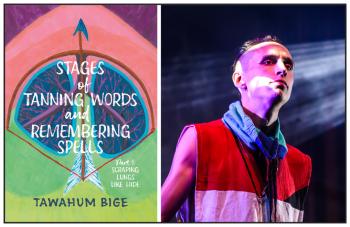Image Caption
Windspeaker.com Books Feature Writer
Local Journalism Initiative Reporter
How powerful is voice? Whether written or spoken, says poet and spoken word artist Tawahum Bige, “voice as a weapon…creates that awareness and it can also galvanize change.”
Bige’s lived experience is “the most central part” in their second collection of poetry, Stages of Tanning Words and Remembering Spells.
“This is what developing a voice looks like for me…”
Bige, who grew up in Surrey, B.C., is Dene Cree Métis on their mother’s side and Hungarian and British on their father’s side. Bige is two-spirit and non-binary, and while they will include this information in their biography, Bige tends to “lean away from the identity politics a little bit…
“I don’t want to get mired in too many conversations about it because we have work to do, actual work on the ground to do. That's more than just us thinking about who we are.”
Stages of Tanning Words follows what Bige considers to be a chronological learning of how to use voice: cry, whimper, holler, laugh, whisper.
“To cry is one of the first things we do as soon as we arrive in this world. So that's where I start and then I like to end with ‘whisper’ after ‘holler’ because I feel like I learned how to be loud long before I ever learned how to be quiet,” Bige said.
The central poem of the collection is found in the section “Holler” and is entitled “Voice.”
“When I look back at my high school years, I could see that using my voice stopped fights before they happened,” said Bige, who added they were usually on the losing side of fist fights.
In “Voice” they write, “I carry only one weapon ever/and it is concealed in this lanky frame/only keen eyes might see/the jaw-width height how my chest rises/and sets the instrument closely nuzzled to my heart/warm blood ignites vocal chords.”
“My biggest exploration (in the book) was can they all be both (poems and spoken word)? And I've learned that they can for sure. But I would say a lot of my work is really spoken. But sometimes the page is really helpful for just organizing things,” Bige said.
Bige earned their creative writing bachelor’s degree from Kwantlen Polytechnic University. They took creative writing in a “big part” because of the loss of their brother and “my mental health was really, really messed up.”
Writing helped them engage with much of their unresolved and old trauma. Indeed, says Bige, despite the intensity and heaviness of some of their work in Stages of Tanning Words, they consider poetry to be a “healing modality.”
“Sometimes the poem is the care. That is the thing that's helping me. Other times you might find that I'm strangely detached from writing the poem and in its creation… (In) getting to share it, I find the healing component of it,” they said.
They add that “a piece” of them often merges their poems and spoken word. They write on the page but the words appear in a “really profound, loud spoken voice in my head.”
“Using that spoken voice, that's where the power truly is. To be in presence with people beyond the digital realm, beyond the written realm, to just being in front of people and be speaking with them and connecting to them, that connection of poetry and storytelling is ceremony to me,” said Bige.
“I say it on the page, but then I spit that poem into a boom mic at a rally and then the people that I'm hoping hear it will feel, not so much that there's hope, but maybe just a little bit more strength in their step for a little bit.”
The crafting of their work is also referenced in the title of the collection, a concept which Bige explains as the development of their voice.
“It's also a connection between the fact that I'm pretty disconnected from my culture, so I don't know a lot about properly tanning hide but I do know something about tanning words. I know about taking time to scrape the words for spells, to remember all of the many different oral histories that we have,” they said.
As for their literary identity, Bige says they are an artist in the colonial setting of Canada, “figuring out a way to keep surviving and keep creating art so that means making use of the identity politics of the state to kind of help me achieve some of my goals.”
It took Bige from 2019 to 2021 to write the collection of poems, which are presented as “Part 1: Scraping Lungs Like Hide” in the book. They will be following up with part two of the collection, but no date has been set. The second part will consist of the work they did not have room to include in this collection.
“(This) book is each aspect of my voice and how it develops…There will be at least another four or five (aspects) in the next book. So once you have both parts, you'll have all of the aspects of the voice that I wanted to explore,” said Bige.
Stages of Tanning Words and Remembering Spells is published by Nightwood Editions and will be available April 15. It can be pre-ordered or purchased through harbourpublishing.com/ or in bookstores.
Local Journalism Initiative Reporters are supported by a financial contribution made by the Government of Canada.

